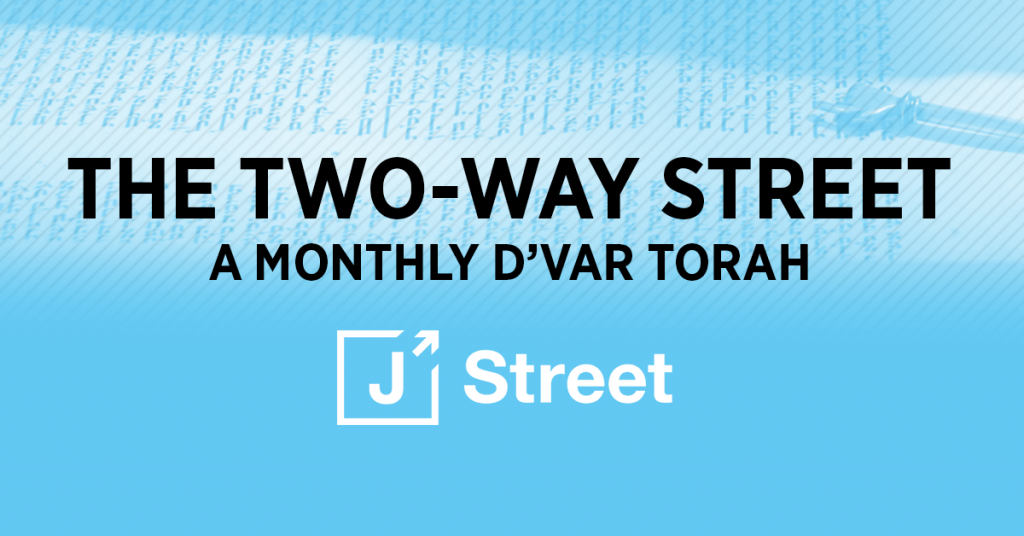- About Us
- Policy Center
- Learn
- Press Room
- Blog
- Get Involved
- Donate
- Donate to J Street Online
- Make a Gift in Someone’s Honor or Memory
- Make a Monthly Gift
- Tax-Deductible Donations
- Giving by mail

There are two very different narratives of the Hanukkah story. One that most of us learned growing up is that Hanukkah celebrates the remarkable military victory of the Maccabees, far outnumbered by the Assyrian Greeks, in their struggle for religious freedom. Hence, the language of the “Al Hanisim” prayer recited (as part of the Amidah and Birkat Hamazon) throughout the week of Hanukkah: “For the miracles, for the deliverance, v’al hag’vurot / for the victories, for the triumphs, and for the battle You fought for our ancestors in those days and at this time.”
The Rabbis placed this prayer in the liturgy for the days of Hanukkah, emphasizing the military and moral strength of Mattathias, his supporters, and God’s dramatic help to “fight their battles, champion their cause, avenge their wrongs . . . delivering the evildoers into the hands of the righteous . . . ” The few vanquished the many, the weak defeated the strong, all for the sake of religious freedom for Jews.
The other story of Hanukkah is the tale of the miracle of a small cruse of pure oil lasting for eight days until more oil could be found for the Temple ritual. This legend gives rise to the ritual of lighting the lights, beginning with one candle on the first night and increasing the light until the hanukkiah is ablaze with eight candles at the end of the week. The symbolism of creating light in the darkness (shared by other religious traditions throughout the world) speaks to a deep human need for light in the dark time of the year, and it evokes a sense of hope and spiritual possibility for our lives and for the world. This longing also finds expression in the Haftarah for Hanukkah, “Not by might and not by power but by My spirit alone.” (Zechariah 4:6)
Fast-forward to the 20th century-Israelis, intoxicated and grateful for their ability to re-inhabit and reinvigorate the Land of Israel, returned to the story of the Jewish victory over the enemy with images such as “Banu hoshech legaresh — We have come to banish the darkness.” The Zionists who drained swamps, gave new life to an ancient language, and built the Land and its cities, identified with the Maccabean warriors. For them, Hanukkah was once again about physical and military strength, exhilarating victories and triumphs.
In our day, many Jews — in America and Israel — have awakened to the peril and folly of the narrative of conquering our enemies. Surely we Jews around the world and in Israel must be vigilant about providing protection for Jewish lives. But there is no military solution to the Israeli-Palestinian conflict. There is no group of heroes who can vanquish the Palestinians. The fantasy that we can find safety by means of overpowering military strength is a dangerous illusion — one that can blind us to the grievous harm that Israel commits (and in which we are complicit), and block our vision for how to break through to a life of peace, safety, and dignity for all the people of the Land.
The voices of “banishing the darkness,” imagining that we can make the Palestinians go away or beat them into submission, have been ascendant for too long in Israel, contributing to the alienation of many American Jews from Israel and Zionism. What needs to be banished is the illusion that we will prevail over the whole Land of Israel. We must banish our arrogance, our denial of evils we have perpetrated or supported, and our destructive wishful thinking that Israel can indefinitely occupy the West Bank and East Jerusalem without threatening Israel’s democracy and Jewish character. This is a time to lay down our longing to vanquish the other side, for this does harm to all the people of the Land.
At this grim time when many doubt that a two-state solution is even possible, we must be guided by the spiritual imagery of Hanukkah: by the light itself, by the crescendo of light increasing throughout the week, and by the sacred words, “Not by might and not by power, but by My Spirit.”
Rabbi Amy Eilberg serves as a spiritual director, kindness coach, and peace and justice educator in the San Francisco Bay Area. She is the author of From Enemy to Friend: Jewish Wisdom and the Pursuit of Peace, published by Orbis Books in March 2014.